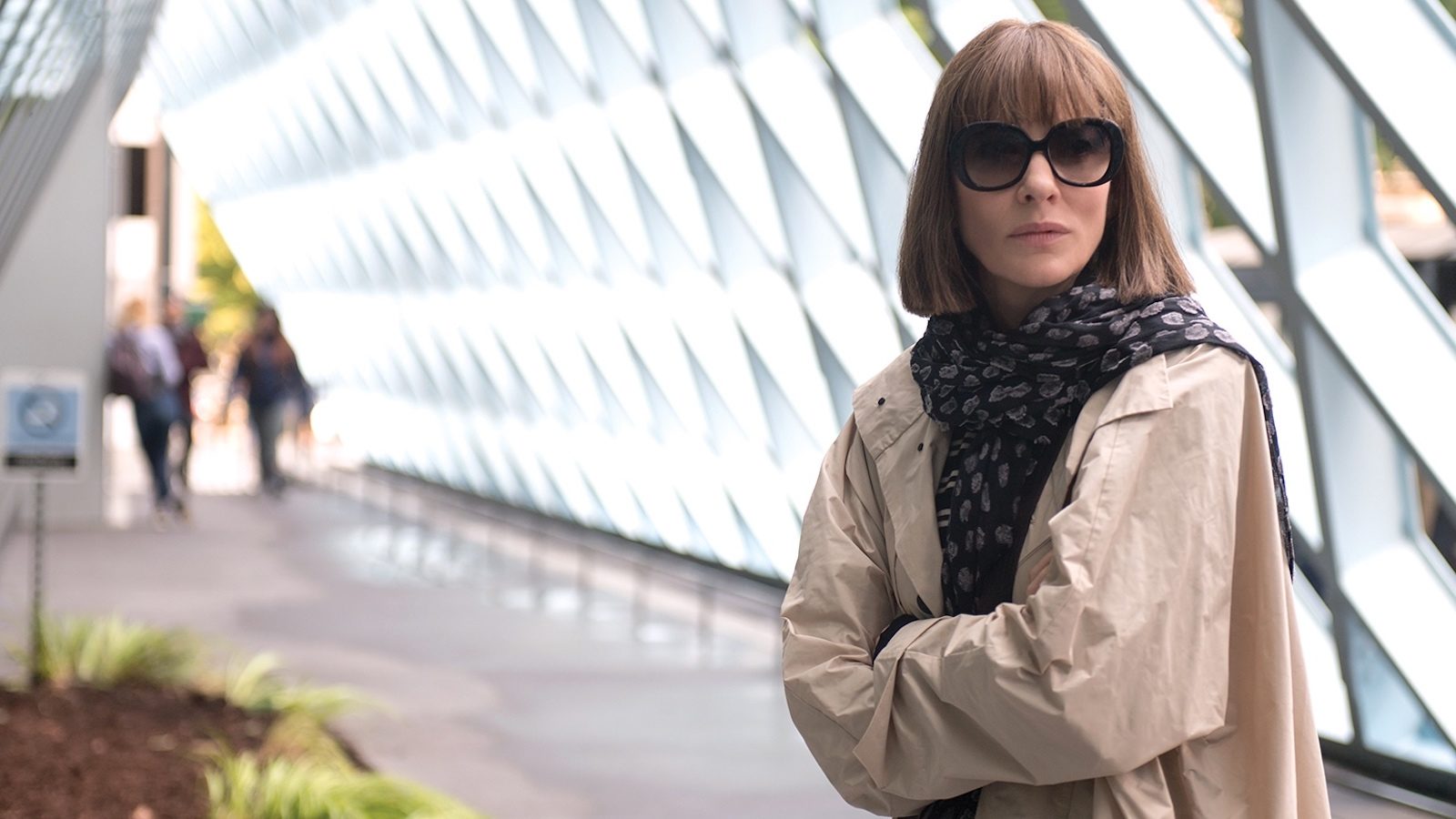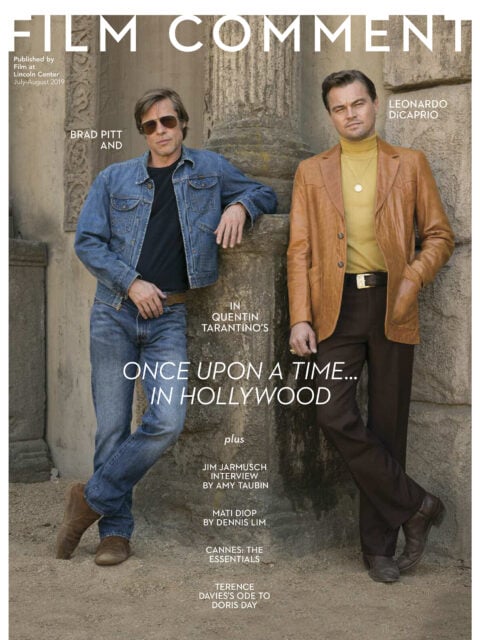By Michael Koresky in the July-August 2019 Issue

The Big Screen: Where’d You Go, Bernadette
(Richard Linklater, USA, Annapurna, Opening: August 16)
One could say that any serious work of cinema, theater, literature, music, painting, photography, or critical writing is in essence an unspoken search for meaning; Richard Linklater’s oeuvre has been explicit in dramatizing these aims. The writer-director may have shifted to a more mainstream narrative register over the years, but the ethos he espoused in such epochal, millennium-adjacent works as Slacker, Before Sunrise, and Waking Life—in which his characters wandered as they wondered about the point of it all—has remained detectable throughout. In his early thirties, Before Sunset’s Jesse (Ethan Hawke) was already feeling existential about aging, musing to his partner in pontification, Celine, about what matters in the ever-spectacular now: “This is it! This is actually happening. What do you think is interesting? What do you think is funny? What do you think is important? You know, every day is our last.”

From the July-August 2019 Issue
Also in this issue
In his latest film, Linklater confronts the gap between youthful expectation and the specter of failure. As the wayward title character in Where’d You Go, Bernadette, based on the 2012 novel by Maria Semple, Cate Blanchett might as well be playing one of the questing teen philosophers from Linklater’s early films, all grown up and chafing at the bonds of an unwanted domestic life. Bernadette Fox is lost, but she was never a slacker. Trapped in a suffocating bourgeois box that is partly of her own making, Bernadette at first appears to be an idle neurotic, an intelligent woman full of promise made invisible, even deranged, by economic or prejudicial circumstance (a Blanchett specialty, seen to varying degrees in Blue Jasmine and Carol). Bernadette is living unhappily in a leaky, labyrinthine house of nooks, crannies, and architectural irregularities in the remote hills of Seattle with her driven, emotionally lucid daughter Bee (Emma Nelson) and geekily opaque husband Elgin Branch (Billy Crudup), a tech research bigwig whose computer animation program was bought by Microsoft, necessitating the family’s move to the Pacific Northwest.
Intensely disliked by many acquaintances, including soccer-mom neighbor Audrey (a nuanced Kristen Wiig, never settling for stereotype), with whom she has an ongoing feud over encroaching blackberry bushes, and her husband’s icy coworker Soo-Lin (Zoë Chao), Bernadette is something of a proud pariah among the city’s moneyed class (“the gnats,” as she calls them). Everything is worrisome in her life, and Linklater masterfully (perhaps to some, frustratingly) plunks the viewer down in the middle of an off-kilter interior world without much context. Plagued by insomnia, agoraphobia, and social anxiety, and gifted with a brain that seems to run miles faster than even her motormouth can keep up with, Bernadette appears always uncomfortable in her skin and surroundings. “I want you to know how hard it is for me sometimes,” she tells her daughter at one moment of clarity. Nerves slowly shredding at the thought of an upcoming trip to Antarctica she promised to Bee, Bernadette tries to get a prescription for an antipsychotic drug that could help alleviate seasickness, which raises alarm bells for an already concerned Elgin. It’s all so unsettling that when we first see her pacing her house and chatting with Manjula, her virtual assistant from Delhi, it takes a moment to realize she isn’t talking to herself à la Blue Jasmine.
In a clever and effective structural gambit, Linklater waits a spell to give us a full picture of the motivations and backstory for her dissatisfactions. It isn’t until a fawning young fan approaches her on the street that we are clued in that Bernadette Fox is no mere local eccentric. She’s “one of architecture’s true enigmas,” explains an amusing online video essay, watched by Bernadette with mounting horror, which tells the story of her early career as a MacArthur Genius and her landmark L.A. constructions: the Beeber Bifocal, which converted an industrial factory into a skylight-roofed home decorated with glass lenses and frames; and the protogreen- living Twenty-Mile House, for which everything in and of the house comes from materials found in a 20-mile radius. (Linklater brings Semple’s architectural concepts to life with convincing sketches and composites.) After seeing her work destroyed by greedy landowners—and suffering a series of miscarriages—Bernadette followed Elgin to Washington’s “Emerald City” and dropped out of sight.
Now that we know that Bernadette’s disquietude—mercurially embodied by Blanchett—is fueled by professional and personal trauma, the remainder of Linklater’s film becomes a poignant adventure story chronicling the character’s journey toward extrication and rejuvenation. Linklater risks broadness, yet never pushes things into satire, taking Bernadette from an angry yet realistically modulated confrontation with Audrey to a nearly screwball intervention scene to a satisfyingly implausible disappearance to Antarctica—without Bee and Elgin, who’d intended to accompany her. Husband and daughter are hot on Bernadette’s trail, always just missing her as she bops from kayak getaway to science research outpost, and all but smuggles herself to the off-limits South Pole; while this extended climax could have gestured toward last-minute farce, Linklater and Blanchett treat Bernadette’s self-rediscovery with the proper gravity. It’s in this unexpected space that the film’s emotional center fully reveals itself, not least in the often-unreadable Elgin’s touching acknowledgment of the role he played in Bernadette’s breakdown, admitting he didn’t encourage her to make her art (Elgin is a great showcase for Crudup’s brand of disconcerting calm). No longer stifled by domesticity or Seattle, Bernadette will soon be free and clear to rebuild her life, quite literally. Where’d You Go, Bernadette is about love, but for an American film, it’s something even rarer—a film about the rekindling of a woman’s brilliant career.







